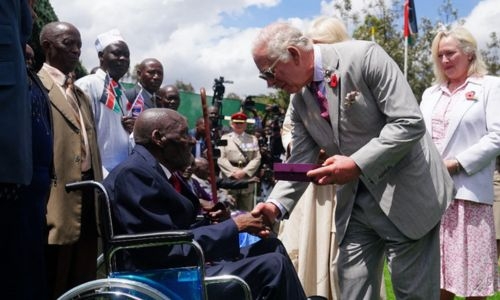King Charles meets Kenya veterans after admitting colonial abuses
AFP | Nairobi
The Daily Tribune – www.newsofbahrain.com
King Charles III paid homage yesterday to Kenyan veterans of World II, after acknowledging there was “no excuse” for colonial-era abuses during Britain’s rule of the East African country.
But his admission of colonial-era atrocities disappointed some Kenyans seeking a formal apology for Britain’s brutal crackdown on the nation’s fight for independence.
The 74-year-old monarch, who began a four-day state visit to Kenya with Queen Camilla on Tuesday, said the “wrongdoings of the past are a cause of the greatest sorrow and the deepest regret,” but stopped short of an apology.
“There were abhorrent and unjustifiable acts of violence committed against Kenyans as they waged... a painful struggle for independence and sovereignty.
And for that, there can be no excuse,” he told a state banquet on Tuesday.
“None of this can change the past but by addressing our history with honesty and openness, we can perhaps demonstrate the strength of our friendship today, and in so doing, we can I hope continue to build an ever-closer bond for the years ahead.”
The Kenya Human Rights Commission (KHRC), which had earlier urged Charles to “issue an unconditional and unequivocal public apology” for colonial abuses, dismissed his remarks as “nothing to write home about”.
“In no way did he acknowledge any of the grave concerns that we have raised,” KHRC programme adviser Martin Mavenjina said. “One would have expected an apology but the king has fallen short of apologising,” he said.
Charles is on his first tour of an African and Commonwealth nation since becoming king last year upon the death of his mother Queen Elizabeth II.
Yesterday, Charles and Camilla visited a war cemetery in Nairobi to honour Africans who died for Britain in two world wars, laying a wreath in front of their graves before meeting Kenyan veterans, some in wheelchairs.
“I hope we can do something special for you,” Charles told one of the veterans as he handed out medals to the former soldiers, part of a British initiative to belatedly recognise the contribution of non-European forces to the war effort.
Related Posts

